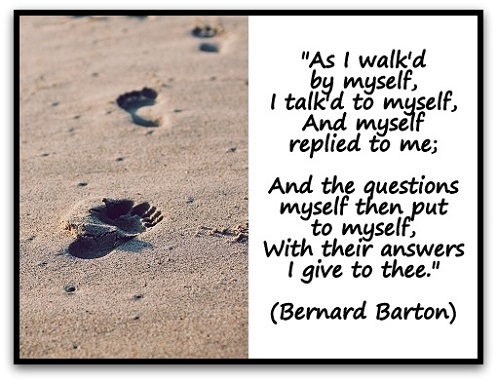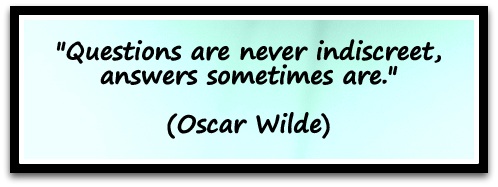Coaching Quote of the Day 29th July 2015

“He who asks questions cannot avoid the answers.”
(Cameroon proverb)

“He who asks questions cannot avoid the answers.”
(Cameroon proverb)

“An expert knows all the answers – if you ask the right questions.”
(Levi Strauss)

“As I walk’d by myself, I talk’d to myself, And myself replied to me; And the questions myself then put to myself, With their answers I give to thee.”
(Bernard Barton)

“Questions are never indiscreet, answers sometimes are.”
(Oscar Wilde)

“The wise man doesn’t give the right answers, he poses the right questions.”
(Claude Levi-Strauss)

“We do not grow by knowing all of the answers, but rather by living with the questions.”
(Max De Pree)
“Confidence, like art, never comes from having all the answers; it comes from being open to all the questions.”
(Earl Gray Stevens)
Imagine the following scenario:
You have asked a straight forward and in your opinion perfectly crafted question to your coaching client. However, the answer you get is actually one that may have lots of words but didn’t actually answer the question you asked!
As a coach there are many things that you can do in such a situation.
One of the things I personally find really useful is to consider:
What question would the answer given make more sense?
We all filter information through various beliefs and values etc to get it to make sense. Sometimes, the questions that we as coaches ask can also get caught up in one of those filters so that the question they “hear” is different to the one asked.
Identifying the question a client actually “heard” can give some indication about the beliefs, values, your clients perceptions and any patterns. It can give you a clue about what is getting in their way.
For example:
As a coach, you ask a client “What would you love to do?”
The response they give you do not believe is something they would love to do at all. The answer is actually a much better fit with the question “What would be the next logical step to take?”
Why can being aware of what question your client actually answered be helpful? Firstly, it can show you what is getting in your clients way and assist you in wording a “killer question.” It may also indicate beliefs and values that impact other areas of their life.
Using the example above, by immediately considering the logical next step they are missing out on considering bigger better things. Are there other beliefs and values about what “admitting” what you actually want means? Perhaps, looking at the logical next step is something that they think is the natural thing that you should always do.
How often do you consider the question your client is actually answering?